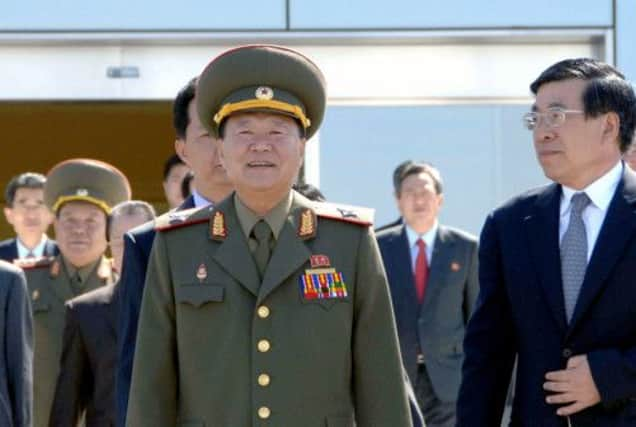North Korea: Nucleur disarmament talks issue raised


Vice-Marshal Choe Ryong Hae’s three-day visit was seen as a diplomatic mission after Pyongyang angered Beijing with snubs and moves to develop its nuclear programme.
Before his return to North Korea yesterday, Vice-Marshal Choe delivered a letter from North Korea leader Kim Jong Un to Chinese president Xi Jinping, saying Pyongyang would take steps to rejoin stalled nuclear disarmament negotiations.
Advertisement
Hide AdAdvertisement
Hide AdThe official China News Service said Vice-Marshal Choe delivered the handwritten letter from Mr Kim to Mr Xi at an afternoon meeting at the Great Hall of the People in central Beijing.
North Korea is willing to work with all sides to “appropriately resolve the relevant questions through the six-party talks and other forms,” the vice-marshal was quoted as saying by Chinese broadcaster CCTV. He said Pyongyang was “willing to take active measures in this regard.”
North Korea quit six-party nuclear disarmament talks in 2009 over disagreements on how to verify steps the North was meant to take to end its nuclear programmes.
Foreign observers often claim that North Korea has a history of raising tensions in an attempt to push its adversaries to negotiations meant to win aid.
Since its third nuclear test, in February, North Korea has repeatedly said that any future diplomatic talks would have to recognise it as a nuclear power. That is at odds with the basis of the six-party talks, and puts Pyongyang at loggerheads with Washington, which says it will not accept North Korea as an atomic power and demands that talks be based on past commitments by the North to abandon its nuclear ambitions.
Still, Vice-Marshal Choe’s remarks seem to indicate an easing of tensions between North Korea and its communist neighbour.
John Delury, a professor at Yonsei University in Seoul, South Korea, who specialises in China and North Korea, said the fact that Mr Kim’s envoy “is being quoted as saying that North Korea is open to China’s suggestions already is a strong signal of kiss and make up”.
He added: “This trip is moving things back to a regular strategic dialogue.”
Advertisement
Hide AdAdvertisement
Hide AdChina has been under intense pressure from Washington to push North Korea into lowering tensions and resuming dialogue.
Mr Xi reaffirmed longstanding ties between the communist neighbours, and urged all sides to “keep cool and exercise restraint”.
The six-party talks should aim to end North Korea’s nuclear programmes and “maintain lasting peace and stability on the peninsula and in northeast Asia,” Mr Xi was quoted as saying.
The meeting followed an unusual half-year gap in high-level contacts during which Pyongyang angered Beijing by conducting rocket launches and a nuclear test – spiking tensions with South Korea and the US.
Beijing considered the moves an affront to its interests in regional stability and showed its displeasure by joining with the US to back United Nations sanctions and cut off dealings with North Korea’s Foreign Trade Bank.
North Korea also frustrated Beijing by refusing to agree to high-level meetings and incensed the Chinese public this month with the detention of a Chinese fishing crew.
“The relationship is rocky, so they will try to mend the relationship,” Cui Yingjiu, a retired professor of Korean at Peking University, said of North Korea.
“Second, they also want to improve relations with the US and need China to be their intermediary.”
Advertisement
Hide AdAdvertisement
Hide AdChina is believed to have agreed to Vice-Marshal Choe’s visit only after Pyongyang committed to returning to the process of negotiation, and required him to state that publicly twice before his meeting with Mr Xi.
SEE ALSO: